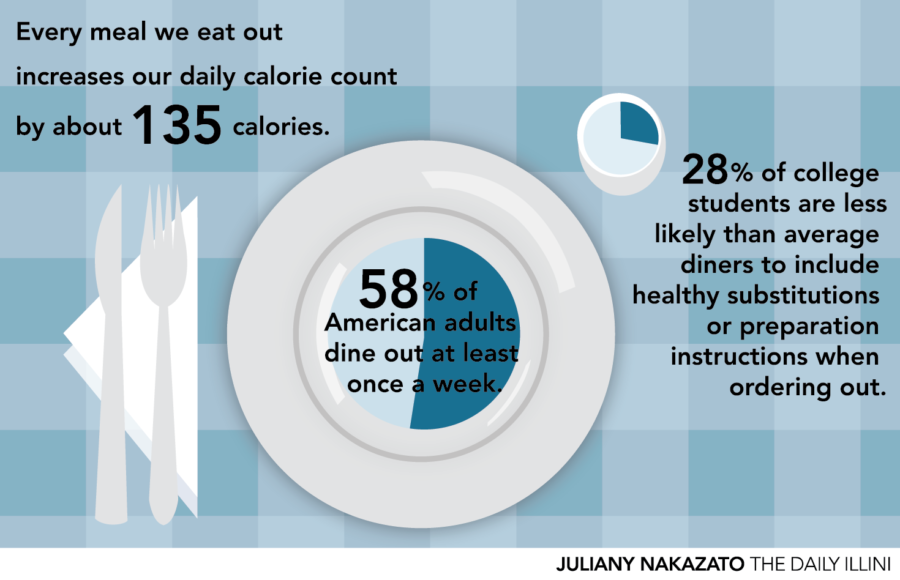Not enough cooks in the literal kitchen
Dec 1, 2015
Thanksgiving for the traditional American family is spent serving a home-cooked turkey at a dining table, surrounded by members of our extended family. However, the reality is, for over 40 percent of Americans, Thanksgiving dinner is the rare event that dinner is home-cooked rather than ordered from a restaurant.
The concept of a home-cooked meal is an important tradition that should be enforced beyond the annual holiday, especially for college students who are just learning to cook for ourselves. It provides us with many benefits such as closer relationships, financial savings and a healthier diet to combat the dreaded “Freshman 15”.
According to The Washington Post, the average time spent cooking by both genders was about 150 minutes per day in the 1960s, contrasting the average 110 minutes per day in 2015.
And while this may seem like a considerable length of time, the Organization for Economic Cooperation and Development found that the United States spends the least amount of time cooking each day than any other developed nation. Instead of spending time to prepare food at home, people are turning to eating out more often instead.
This is unfortunate in that cooking creates an array of benefits such as closer relationships and bonds. The process of cooking and eating with family provides us with time to connect and bond with others, which is often neglected in the hectic schedules of our lives.
Get The Daily Illini in your inbox!
College students are often overwhelmed by tests, homework and other commitments, but cooking provides time to reconnect with friends or roommates by preparing and eating a meal together. Cooking is also a popular way to destress and enjoy oneself during leisure time, a way to take our mind off of periodic tables and quadratic formulas for a short period of time.
Michael Pollan, author of the bestselling book, “The Omnivore’s Dilemma” and the more recent “Cooked: A Natural History of Transformation” explores the social importance of cooking in his work. In an interview with The Boston Globe, Pollan explains, “Cooking isn’t just about preparing the fuel for your body. Cooking is a social act and it has been since we started.”
Cooking at home allows for a healthier diet, as opposed to the processed and unhealthy fast food that we tend to gravitate towards when eating out. This is because cooking often causes the individual to eat more simplistic meals — without all the greasy fries and artificially flavored chips.
Cooking your own meals often results in dishes that are truer to the raw ingredients, such as salads, sandwiches, soups — simply because it is easier to make.
For college students who often worry about the common problem of the “Freshman 15”, cooking our own meals provides a way to avoid the unhealthy, sudden weight gain caused by the excessive indulgence in Chinese take-out or pizza deliveries.
In addition, although many low-budget college students assume that home cooked meals are more expensive than eating out, this is not exactly the case.
The cost of a meal and the cost of groceries may be similar in some cases, but the crucial difference is that the home cooked meal will provide more food. Food at home is often prepared in greater quantities than the restaurant meals — either to feed more people, or to store and eat later.
Therefore, the cost per meal at home is actually much cheaper than eating out, when factoring in the cost of meal per person. This is a very helpful way to save money, especially for students whose costs of tuition and books requires them to save every penny they can.
Home cooked meals also do not take considerably longer to prepare, when working with simplistic recipes that don’t require too many ingredients. Take-out may even take longer in certain situations, when considering travel time and waiting for the order at the restaurant. A simple thirty minute trip to the grocery store each week may save hours of lost time from take-out food.
As we enjoy and indulge in the festivities of mashed potatoes and stuffing during the holiday season at home, it is important to carry on the practice of cooking one’s own meals into a frequent habit. Creating a routine of cooking our own meals from the start—the first independent adult years in college — can help us become happier and fitter people in the future.
Minju is a freshman in LAS.






